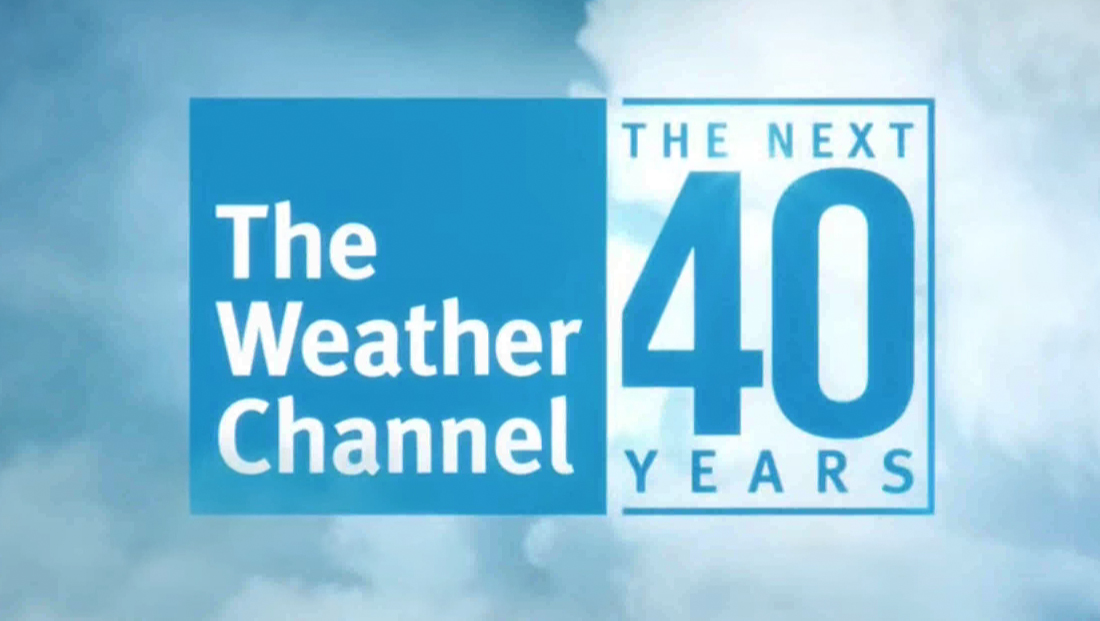The Weather Channel marks 40th with a look toward the future of the planet

Weekly insights on the technology, production and business decisions shaping media and broadcast. Free to access. Independent coverage. Unsubscribe anytime.
Cable TV pioneer The Weather Channel is celebrating its 40th anniversary — but instead of branding it as “birthday,” it’s leveraging the opportunity to look ahead to what weather and climate will look for in 2062.
The network officially turned 40 May 2, 2022 and used the days leading up to it to air a variety of retrospectives, interviews with staffers and stories about the future of weather, climate and technology.
The network is branding its celebration as “The Next 40 Years” with a look that uses its blue square box with a three-sided outline off to the right with the words “The Next” above a large, bold “40” and “Years” under it.
In a somewhat odd design choice, the far left of the numeral “4” appears to have been chopped off, presumably part of an effort to get everything to fit in a narrower space, but sort of ends up looking like a mistake or animation that didn’t quite finish its entire reveal of the number.

Typography appears to use the same as the network uses in its primary graphics package, leaving the distinctive one in its logo alone in that role.
In keeping with the theme of the future, the network produced both an English and Spanish-language (the latter for its newly launched Spanish-language streamer network) virtual explainer featuring different personalities placed digitally into the same scenes.
Virtual reality was used to create a rendering of what a flood wall barrier protecting New York City might look like, which pulled out to show a sweeping view of Manhattan while data appeared on the front of the structure and a key figure was superimposed on the surface of the water.
Also included was a farm scene explaining how climate shifts could affect crops in the U.S. and how drones and other technology might help keep plants alive and increase yield, while a street scene was used to illustrate how weather information might be distributed in the future.
This included a large wraparound LED screen that appears to have a 3D effect similar to that virtual Japanese one with an oversized animation of a cat. Although the LED really fronts the two facades of the building, the imagery fed to it makes it appear as if there’s a shelf or cubby there, creating the illusion of an indented, covered and enclosed space.
The scene also points out that weather information will become an increasing important factor in space travel, as a rocket blasts off in the skyline beyond.
The Weather Channel has also been airing a series of promos commemorating its anniversary and special features looking ahead.
In addition, promos that tout the recent YouGov survey that found the network to be the most trusted cable news network in the U.S. have been airing.
The Weather Channel launched in 1982 at a time when cable TV was in its infancy — and many doubted the venture would be successful, including many predicting that the channel wouldn’t be able to find enough content to fill 24 hours a day.
Launched by Landmark Communications, the network also introduced the then cutting edge idea of deploying computer units to local cable headends that could insert computer generated local forecasts based on viewers’ regions, though a national feed was also provided for providers who opted not to participate in the so-called “Local on the 8s” feature.
These systems typically pulled from National Weather Service data and maps and have gradually grown in visual sophistication, moving away from the 8-bit style look to full HD designs with dynamic advertising, full-motion radar loops and typography that matches the network’s graphics package. The Weather Channel still runs a separate service called WeatherScan that offers computer generated images 24 hours a day.
Landmark would sell to NBCUniversal, Bain Capital and Blackstone Group in 2008. At the time, NBC announced it would shut down its own Weather Plus offering that largely attempted to replicate The Weather Channel model and also encouraged local stations to use the name for their own forecasts and offer a 24 hour channel featuring an L-bar with weather information that framed a mix of national and local video content.
After the purchase, most NBC stations dropped the Weather Plus branding and local stations either shuttered their Weather Plus channels or shifted to using a similar service from a third party vendor. NBC also discontinued the national Weather Plus feed.
The time also saw WXC personalities appear on NBC properties, including MSNBC and CNBC.
In 2016, NBCU sold the non-television components, including key forecasting technology, to IBM, forming The Weather Company. At the same time, The Weather Channel signed a long term deal to license data and other services from the newly-formed IBM business.
NBC sold The Weather Channel to Byron Allen’s Entertainment Studios in 2018 and continues to operate under the IBM deal, including labeling certain properties as “an IBM Business.”




tags
Explainers, the weather channel
categories
Broadcast Industry News, Featured, Weather